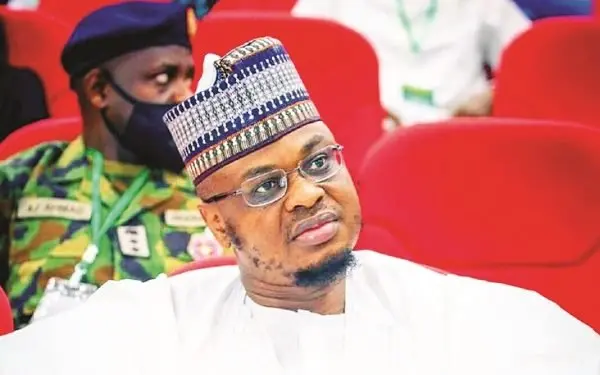Lately, there has been a rash of tech contracts, all wearing the accoutrement of patriotism and the insignia of a government that is desperate to leave a fertile legacy for the people. The little problem is that time is running out fast for this administration and it is nigh impossible to bundle high end projects into the few days that are left in its lifespan. Just over a month!
Let’s take a few screaming headlines in the past few days and months, just a few: FG awards Over N85bn Census Contract to Zinox Technologies (The Guardian, February 9, 2023); Census: FEC approves N15.3bn for ICT devices to aid exercise (Premium Times, April 6, 2023); and FEC approves N24.2bn free Internet for 20 airports, varsities and markets (Vanguard, March 29, 2023).
Beautiful projects, you may want to suggest. There is no doubt that the nation needs a dependable census in order to save us from frivolities with figures. It is hardly possible for two government departments to quote the same population figure for the country. Everything is guesswork, making planning even a guesswork because there is no structured explanation of the number of people the nation is planning for.
There is also no doubt that Zinox Technologies, the first major indigenous computer manufacturers with high networth international reach, is appropriately suited to handle this huge project. Two tech contracts or more have been awarded for the same project. The eyebrows could be kept very busy, being raised all the time at the nature of contracts being awarded at the twilight of this administration. A question by a layman here is what contracts are being awarded that couldn’t be bundled into one to deliver on a project. The people behind Zinox, including the chairman, Leo Stan Ekeh, have proven so much of their tech mettle that they couldn’t just be selling shells to the National Population Commission (NPC) without any blood (software) running in them. There has to be a convenient explanation for the various contracts.
There is another problem anyway. The Nigerian government has done so badly with technology lately, especially viewed from the template of INEC 2023 election disaster, that it will prove a little Herculean for any one in government to canvas for credulous acceptance of their activities based on the dependability of technology. Just add the Adamawa supplementary election outcome to the plate of disasters on INEC’s table, it becomes even more difficult and an undeserved haste for the government to be pushing for a census using technology, without putting a closure to very troubling elections.
However, the most puzzling of the contracts is the rollout of WiFi at airports, varsities and markets across the nation. Attractive as it may sound and look, it breaks all credulity, strains business sense, questions morality and demonstrates the government’s meddlesomeness in places where it has no business.
This writer can say here without equivocations that there are already provisions by the Universal Service Provision Fund (USPF), domiciled at the Nigerian Communications Commission (NCC), and National Information Technology Development Agency (NITDA), (you may also want to add Tertiary Education Trust Fund, TETFUND), to fund technology rollout in higher institutions. However, this particular contract has been passed to the NCC for funding instead of those other bodies. What business has the regulator with the airport WiFi?
Announcing such a needless intervention, a happy Minister of Communications and Digital Economy, Dr Isa Pantami, said:
“The Federal Executive Council today approved two memos for the Nigerian Communications Commission, a parastatal under the supervision of the Federal Ministry of Communications and Digital Economy.
“In these two memos, certain intervention projects are going to be implemented by the federal government of Nigeria, through the Nigerian Communications Commission, of providing internet in 20 selected airports in Nigeria and higher institutions of learning and also some markets to support micro, small and medium enterprises.”
The minister’s effusions are understandable but totally misplaced and misdirected. Those funds being taken from the NCC are not for the right cause.
It is the responsibility of the Federal Airports Authority of Nigeria (FAAN) to develop its facilities as stated in the FAAN Act of 1996 as amended in 1999. It states in part:
“To develop, provide and maintain at airports and within the Nigeria Air Space all necessary services and facilities for the safe, orderly, expeditious and economic operations of air transport.
“To provide adequate conditions under which passengers and goods may be carried by air and under which aircraft may be used for other gainful purposes, and for prohibiting the carriage by air of goods of such classes as may be prescribed.”
The Act accommodates relationships with other parties like agents or working in partnership with other persons to build out facilities for passengers’ comfort and general efficiency of the airport.
Since nothing is novel under the sun and Nigeria does not live in isolation from the rest of the world, we decided to have a quick check at some of the most popular airports around the world. First stop was London Heathrow.
When the Heathrow management needed to upgrade the airport WiFi facilities in April 2019 for the delight of its numerous passengers, it got into a relationship with an American Internet service provider, Boingo, which provides such tech services in different airports across the world.
At the time, property head at Heathrow, John Arbuckle said: “Whether passengers are streaming, browsing or working on the go, we’re excited to improve their connectivity experience with the latest generation of Boingo’s award-winning Wi-Fi.
“This is just one of many initiatives that Heathrow has invested in to serve and delight our 80 million passengers, making Heathrow a world-class airport.”
Dawn Callahan, Boingo chief marketing officer, called their Passpoint Wi-Fi technology a game-changer which they were happy to introduce at Heathrow.
Next stop is Dubai, the tiny Emirate country that some Nigerians love to vacation in or even buy property at the Burj Khalifa with stolen money just to rub shoulders with genuine dollar billionaires from other parts of the world.
Five years earlier, in February 2014, Boingo was selected to manage the WiFi facility and digital advertising sales and support for Dubai International (DXB) and Al Maktoum International at Dubai World Central with a combined traffic of 66 million passengers at the time. The facility would allow passengers easy access to high speed internet and entertainment contents.
October 2005, Boingo was among the three wireless internet service providers selected to provide WiFi facilities at the Hartsfield-Jackson Atlanta International Airport; the other two being Concourse Communications Group LLC and Sprint Nextel Corp.
Boingo is also a leading WiFi service provider to some of the major airports around the world, including: Beijing Capital International, Tokyo International, O’Hare International and JFK International in New York.
This material is not about Boingo but just to demonstrate here that there is nothing we are doing in Nigeria that has not been done in other parts of the world, even in a much better way. It is the responsibility of the airport authority or owners to develop and maintain facilities at the airport, and to pick partners who can monetise the facilities so deployed. Running the airport is a major business for professionals with niche specialisation. It is therefore unconscionable to blackmail parastatals like the NCC to fund projects which are outside the provisions of the Acts establishing them or projects not originally budgeted for.
“So, we have set our team in order, we have developed the sustainability model, so that even after the deployment, the maintenance will be very effective,” the minister said.
Who are the we and who is deploying what and who is maintaining the facility? It is free WiFi to the unsuspecting airport user. What is the subterranean thinking behind this WiFi freebie? This, for me, looks more like a shrouded gambit leading to ill intentions.
One is beginning to suspect that the major reason the nation is in so much financial difficulty, with many more people slipping into multidimensional poverty, is because there are so many funds going into the wrong projects where there are embedded interests.
In which other country of the world is the telecoms regulator building WiFi at the airports?
The NCC has been corralled for the wrong reasons and pushed beyond the confines of basic telecoms regulations. There is fear, financial and intellectual haemorrhage at the organisation because of extraneous pressure, and the system seems too conquered to complain or even cry out in pain. This regulator needs help. Urgently!







